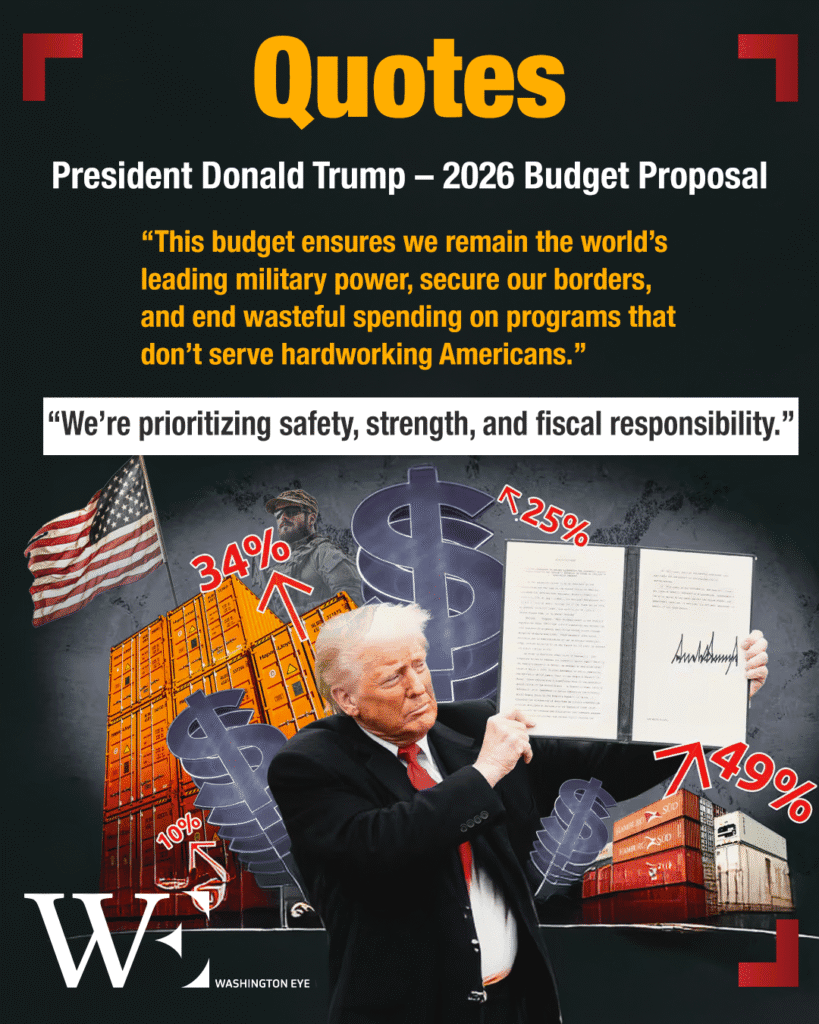President Donald Trump’s proposed federal budget for fiscal year 2026 has reignited a national debate over government spending priorities, drawing sharp criticism from education advocates, scientists, and public broadcasters, while earning praise from national security proponents and fiscal conservatives.
The $6.8 trillion budget, unveiled last week, calls for deep cuts to non-defense domestic programs while increasing spending on defense, homeland security, and space exploration. The proposal boosts the Department of Defense budget by 13% and increases the Department of Homeland Security budget by nearly 65%, reflecting what administration officials describe as a “security-first, America-first” strategy.
“This budget ensures we remain the world’s leading military power, secure our borders, and end wasteful spending on programs that don’t serve hardworking Americans,” President Trump said during a White House press conference. “We’re prioritizing safety, strength, and fiscal responsibility.”
Cuts to Education and Early Childhood Programs
Among the most controversial measures is the proposed elimination of Head Start, the federally funded early childhood education program that has provided services to low-income families since 1965. The administration argues that the program is no longer effective and should be phased out, despite studies showing its long-term benefits on educational outcomes and social mobility.
In Connecticut, state officials estimate that more than 6,000 children could lose access to Head Start services if the cut is enacted. The state would forfeit $71 million in federal funding, forcing many local centers to shut down. Education advocates warn that eliminating the program would disproportionately affect low-income communities and widen educational disparities, particularly in rural areas and communities of color.
Education groups are mobilizing to oppose the cut, emphasizing the program’s role in preparing young children for school and supporting working families who rely on affordable early childhood education options.
Defunding Public Broadcasting
The budget also proposes eliminating federal funding for the Corporation for Public Broadcasting, which provides critical financial support to NPR, PBS, and hundreds of local public radio and television stations across the country. An executive order accompanying the proposal cites “bias and political activism” as justification for defunding what the administration describes as partisan outlets.
Leaders from public broadcasting organizations have warned that the proposed cuts could devastate local stations, particularly those in rural areas that depend heavily on federal grants to stay on the air. Without federal support, many small stations may face closure, reducing access to local journalism, educational programming, and emergency broadcasting services in underserved regions.
Advocates for public broadcasting argue that eliminating federal funding would undermine one of the few non-commercial news and cultural networks accessible to millions of Americans, especially in areas where commercial media coverage is limited.
Cuts to Science, Climate, and Health
The budget includes major cuts to federal science, health, and environmental agencies. Funding for the National Institutes of Health (NIH) would be reduced by 40%, while the Environmental Protection Agency (EPA) faces a 50% budget cut. The National Oceanic and Atmospheric Administration (NOAA) would also lose funding for key climate research and weather monitoring programs.
Scientific organizations and environmental groups have raised alarms, warning that the cuts could jeopardize research on public health, climate change, and environmental protection. Critics argue that reducing funding for NIH could slow progress on cancer research, infectious disease preparedness, and other critical health initiatives. Similarly, cuts to the EPA could limit enforcement of air and water quality standards and hamper efforts to address environmental hazards.
Observers note that the budget’s emphasis on defense spending comes at the expense of investments in science and environmental stewardship, raising concerns about the long-term impacts on innovation, health outcomes, and climate resilience.
Supporters Praise Focus on Security and Fiscal Discipline
Supporters of the budget have praised its focus on military readiness, border security, and deficit reduction. Defense analysts and national security advocates argue that increased funding for missile defense, cybersecurity, and border enforcement reflects the need to respond to evolving global threats.
Fiscal conservatives have applauded the proposed reductions to domestic programs, viewing them as steps toward reducing government spending and curbing the federal deficit. The administration projects $1.4 trillion in deficit savings over the next decade, although some economists question whether the projections rely on overly optimistic economic growth assumptions.
Congressional Battle Looms
The budget proposal now heads to Congress, where it faces an uphill battle in the Democrat-controlled Senate and mixed reactions in the House. Several moderate Republicans have expressed reservations about eliminating widely supported programs like Head Start and public broadcasting, signaling potential challenges for the proposal’s passage.
Senate leaders have vowed to oppose cuts they describe as harmful to working families, students, and vulnerable communities. House leadership has indicated openness to negotiating certain provisions but emphasized the need to balance fiscal responsibility with preserving essential services.
Budget analysts expect months of debate, amendments, and negotiations before a final spending package is approved. Lawmakers from both parties are already preparing to advocate for restoring funding to specific programs targeted for cuts.
A Broader Policy Signal
Beyond the budget numbers, analysts see the proposal as a reflection of the Trump administration’s broader policy priorities: reducing government involvement in education, media, and scientific research, while expanding investments in defense, border security, and space exploration.
Policy experts suggest that the budget serves as both a fiscal blueprint and a political statement about the administration’s vision for the role of government. The outcome of the congressional budget process will not only determine federal spending but also shape the future of key public services that millions of Americans rely on.
As lawmakers prepare to debate the proposal in the coming months, the stakes extend beyond partisan lines, touching on fundamental questions about national priorities, public investment, and the balance between security and social welfare.
















